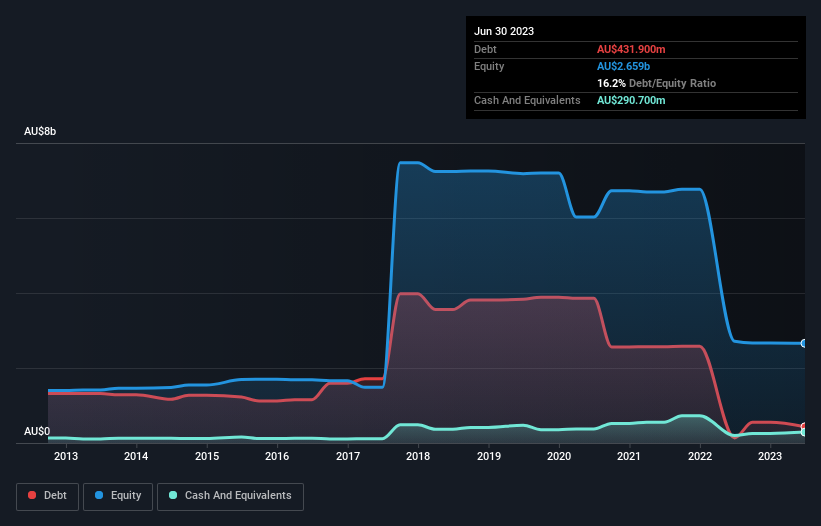Warren Buffett famously said, 'Volatility is far from synonymous with risk.' It's only natural to consider a company's balance sheet when you examine how risky it is, since debt is often involved when a business collapses. Importantly, Tabcorp Holdings Limited (ASX:TAH) does carry debt. But the real question is whether this debt is making the company risky.
What Risk Does Debt Bring?
Debt and other liabilities become risky for a business when it cannot easily fulfill those obligations, either with free cash flow or by raising capital at an attractive price. Ultimately, if the company can't fulfill its legal obligations to repay debt, shareholders could walk away with nothing. However, a more frequent (but still costly) occurrence is where a company must issue shares at bargain-basement prices, permanently diluting shareholders, just to shore up its balance sheet. By replacing dilution, though, debt can be an extremely good tool for businesses that need capital to invest in growth at high rates of return. The first thing to do when considering how much debt a business uses is to look at its cash and debt together.
See our latest analysis for Tabcorp Holdings
How Much Debt Does Tabcorp Holdings Carry?
As you can see below, at the end of June 2023, Tabcorp Holdings had AU$431.9m of debt, up from AU$135.3m a year ago. Click the image for more detail. On the flip side, it has AU$290.7m in cash leading to net debt of about AU$141.2m.

How Healthy Is Tabcorp Holdings' Balance Sheet?
The latest balance sheet data shows that Tabcorp Holdings had liabilities of AU$667.3m due within a year, and liabilities of AU$726.0m falling due after that. Offsetting this, it had AU$290.7m in cash and AU$176.6m in receivables that were due within 12 months. So it has liabilities totalling AU$926.0m more than its cash and near-term receivables, combined.
While this might seem like a lot, it is not so bad since Tabcorp Holdings has a market capitalization of AU$2.09b, and so it could probably strengthen its balance sheet by raising capital if it needed to. However, it is still worthwhile taking a close look at its ability to pay off debt.
We measure a company's debt load relative to its earnings power by looking at its net debt divided by its earnings before interest, tax, depreciation, and amortization (EBITDA) and by calculating how easily its earnings before interest and tax (EBIT) cover its interest expense (interest cover). The advantage of this approach is that we take into account both the absolute quantum of debt (with net debt to EBITDA) and the actual interest expenses associated with that debt (with its interest cover ratio).
While Tabcorp Holdings's low debt to EBITDA ratio of 0.60 suggests only modest use of debt, the fact that EBIT only covered the interest expense by 4.7 times last year does give us pause. So we'd recommend keeping a close eye on the impact financing costs are having on the business. We also note that Tabcorp Holdings improved its EBIT from a last year's loss to a positive AU$111m. The balance sheet is clearly the area to focus on when you are analysing debt. But it is future earnings, more than anything, that will determine Tabcorp Holdings's ability to maintain a healthy balance sheet going forward. So if you want to see what the professionals think, you might find this free report on analyst profit forecasts to be interesting.
Finally, while the tax-man may adore accounting profits, lenders only accept cold hard cash. So it is important to check how much of its earnings before interest and tax (EBIT) converts to actual free cash flow. Over the last year, Tabcorp Holdings saw substantial negative free cash flow, in total. While investors are no doubt expecting a reversal of that situation in due course, it clearly does mean its use of debt is more risky.
Our View
Tabcorp Holdings's struggle to convert EBIT to free cash flow had us second guessing its balance sheet strength, but the other data-points we considered were relatively redeeming. In particular, its net debt to EBITDA was re-invigorating. Taking the abovementioned factors together we do think Tabcorp Holdings's debt poses some risks to the business. While that debt can boost returns, we think the company has enough leverage now. In light of our reservations about the company's balance sheet, it seems sensible to check if insiders have been selling shares recently.
If you're interested in investing in businesses that can grow profits without the burden of debt, then check out this free list of growing businesses that have net cash on the balance sheet.
Valuation is complex, but we're here to simplify it.
Discover if Tabcorp Holdings might be undervalued or overvalued with our detailed analysis, featuring fair value estimates, potential risks, dividends, insider trades, and its financial condition.
Access Free AnalysisHave feedback on this article? Concerned about the content? Get in touch with us directly. Alternatively, email editorial-team (at) simplywallst.com.
This article by Simply Wall St is general in nature. We provide commentary based on historical data and analyst forecasts only using an unbiased methodology and our articles are not intended to be financial advice. It does not constitute a recommendation to buy or sell any stock, and does not take account of your objectives, or your financial situation. We aim to bring you long-term focused analysis driven by fundamental data. Note that our analysis may not factor in the latest price-sensitive company announcements or qualitative material. Simply Wall St has no position in any stocks mentioned.
About ASX:TAH
Tabcorp Holdings
Provides gambling, and entertainment and integrity services in Australia.
Moderate growth potential with acceptable track record.
Similar Companies
Market Insights
Community Narratives



